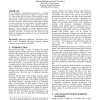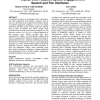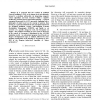811 search results - page 125 / 163 » Learning Design in Adaptive Educational Hypermedia Systems |
ITS
2000
Springer
13 years 11 months ago
2000
Springer
We are designing a computational architecture for a "learning economy" based on personal software agents who represent users in a virtual society and assist them in find...
ICCBR
2001
Springer
14 years 10 days ago
2001
Springer
It is useful for an intelligent software agent to be able to adapt to new demands from an environment. Such adaptation can be viewed as a redesign problem; an agent has some origin...
CHI
2008
ACM
13 years 10 months ago
2008
ACM
As emphasis is placed on developing mobile, educational, and other applications that minimize cognitive load on users, it is becoming more essential to base interface design on im...
IJCNN
2006
IEEE
14 years 1 months ago
2006
IEEE
—It is proposed that the creation of Artificial General Intelligence (AGI) at the human level and ultimately beyond is a problem addressable via integrating computer science algo...
ECTEL
2009
Springer
14 years 16 days ago
2009
Springer
Work-integrated learning (WIL) poses unique challenges for user model design: on the one hand users’ knowledge levels need to be determined based on their work activities – tes...




